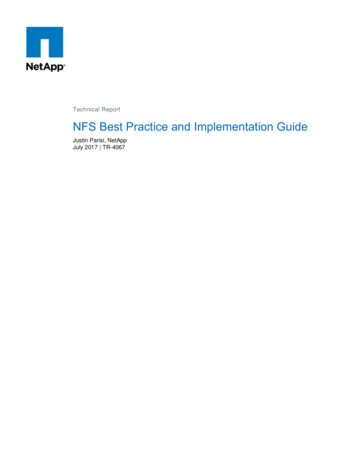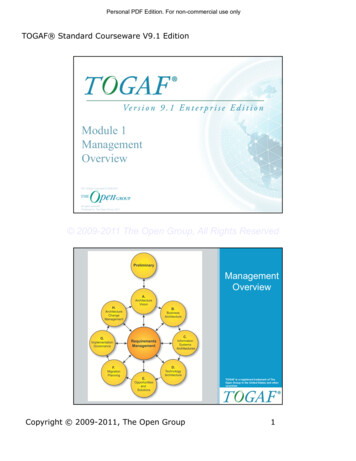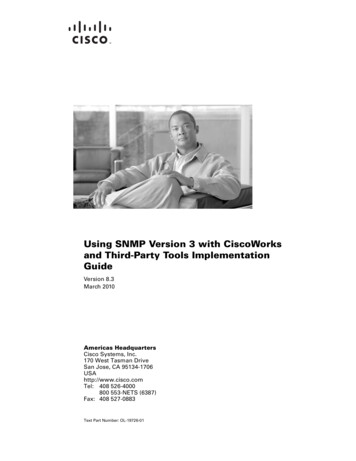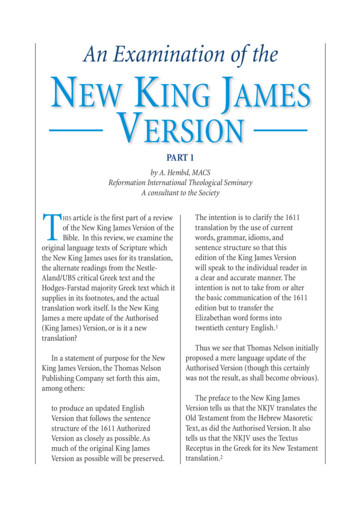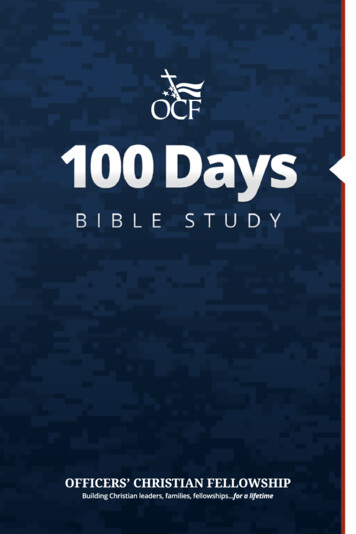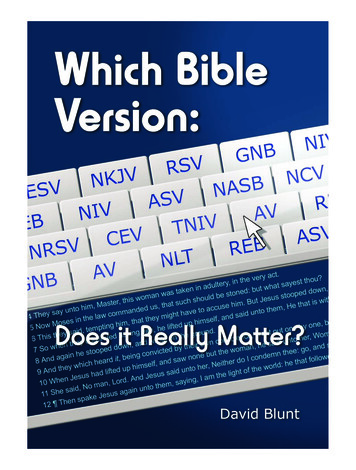
Transcription
A121 Which Version 2:A121 Which Version04/07/200712:32Page 1
A121 Which Version 2:A121 Which Version04/07/200712:33Page 3Which BibleVersion:Does it Really Matter?David Blunt
A121 Which Version 2:A121 Which Version04/07/200712:33Page 4ISBN 978 1 86228 314 5 2007 Trinitarian Bible SocietyTyndale House, Dorset Road, London, SW19 3NN, UK6M/06/09
A121 Which Version 2:A121 Which Version04/07/200712:33Page 1Which Bible Version:Does it Really Matter?(Based on an address given by the Rev. David Blunt tothe TBS Day Conference held in Inverness, Scotland, October 2003)The subject of Bible versions is by no means an academic one, as some may think. Itmay have academic aspects to it but it is really a very personal subject which affectsevery believer. We trust that we have all been called by the grace of God to know andlove the Lord Jesus Christ. Our desire now is to glorify and to enjoy God. We believethat the Word of God is the only rule to direct us in this our chief end and we believethat the Word of God is to be found only in the Bible. If we are to glorify and enjoyGod then we are bound to make use of the Bible. But which Bible are we to use? Thereare a great many versions on offer today. We must therefore make a choice of one version from among the many. Which one will it be? Will it be the Authorised Version?Will it be a modern version? Does it really matter? Every Christian should have a keeninterest in this subject.Satan’s StrategyBefore answering the specific question, ‘Which Version: Does it Really Matter?’ weneed to establish a very important point. The fact is often overlooked that there issomeone else who is interested in our subject. The devil has a very keen interestindeed in the Scriptures. That should not surprise us when we understand that theWord is the chief means whereby God makes Himself known. The Psalmist said,‘ thou hast magnified thy word above all thy name’ (Psalm 138.2). Satan does notwish God to be known—at least not in a saving way. The devil’s interest in the Wordof God is therefore a malicious one. We ignore this fact at our peril.The Bible itself shows us Satan’s strategy concerning Scripture. We may see it inconnection with the very first words which God spoke to man: ‘Of every tree of the1
A121 Which Version 2:A121 Which Version04/07/200712:33Page 2Which Bible Version garden thou mayest freely eat: but of the tree of the knowledge of good and evil,thou shalt not eat of it: for in the day that thou eatest thereof thou shalt surely die’(Genesis 2.16–17).That was the original text. What did Satan do with it? He queried it. Appearingas a serpent he said to the woman, ‘Yea, hath God said, Ye shall not eat of every tree ofthe garden?’ (Genesis 3.1). Satan’s strategy is in various ways to sow doubt in ourminds concerning the Word of God.What was the result of Satan’s strategy? We see it in the woman’s response to theserpent. ‘We may eat of the fruit of the trees of the garden: but of the fruit of the treewhich is in the midst of the garden, God hath said, Ye shall not eat of it, neither shallye touch it, lest ye die’ (Genesis 3.2–3).That was the new text. The original text which God had given was altered. Threethings happened:Omission: Eve omitted the words ‘every’ (‘every tree’) and ‘freely’ (‘freely eat’).Addition: Eve added the words ‘neither shall ye touch it’.Substitution: Eve substituted the words ‘lest ye die’ for ‘thou shalt surely die’.Thus was born the first ‘revised version’ of the Word of God. It is the paradigm forSatan’s attempts down through history to nullify the Word of God.This strategy was seen when the Lord Jesus Christ appeared in this world. Whenhe tempted Christ in the wilderness the devil was so bold as to quote the Scripturesto the Son of God. Luke has the fullest account of this incident. This is how hedescribes the third and final temptation:And he brought him to Jerusalem, and set him on a pinnacle of the temple,and said unto him, If thou be the Son of God, cast thyself down from hence:for it is written, He shall give his angels charge over thee, to keep thee: andin their hands they shall bear thee up, lest at any time thou dash thy footagainst a stone. (Luke 4.9–11)Here is a precious promise for God’s people: preservation in time of trouble anddanger. It is a quote from the Book of Psalms—and yet it is a misquote. The originalreads:For he shall give his angels charge over thee, to keep thee in all thy ways.2
A121 Which Version 2:A121 Which Version04/07/200712:33Page 3 Does it really matter?They shall bear thee up in their hands, lest thou dash thy foot against astone. (Psalm 91.11–12)The devil omitted the words ‘in all thy ways’ from the first part of the verse andadded the words ‘at any time’ to the second part and so perverted the meaning of thetext. God’s promise that He will keep His own is only to be enjoyed within certain limits—as we walk in His ways, in the paths of righteousness. We never have a license tosin and we have no warrant from God for reckless conduct. It is therefore presumption to expect the Lord to keep us if we are bent on folly. Well did Christ respond toSatan with a text from Deuteronomy quoted accurately and in context: ‘It is said,Thou shalt not tempt the Lord thy God’ (Luke 4.12).Oh, the subtlety of Satan! This is his great hallmark. ‘Now the serpent was moresubtil than any beast of the field which the LORD God had made’ (Genesis 3.1).‘ButI fear, lest by any means, as the serpent beguiled Eve through his subtilty, soyour minds should be corrupted from the simplicity that is in Christ’(2 Corinthians 11.3). Yes, the devil is behind the banning of the Bible and the burning of the Bible, but he is also historically behind the blurring of the Bible throughthe circulation of a revised or altered text. Consider that! It has profound implications for our present day when there are competing texts of the Word of God incirculation. The church is confused and the world is bemused. How clever a strategy the devil has employed! You see, if people lose confidence in the inspiration,purity and trustworthiness of the Word of God then the devil has won, no matterthat those same people still hold a copy of some version or other of the Bible intheir hands—or more likely by then, have a copy somewhere on their shelves, rarelystudied or prayed over.The devil seeks to alter the Word of God. We have noted the three main types oftextual change he sponsors: omission, addition, substitution. We may say a little moreabout each of these. In each instance the words which are affected are highlighted.1. OmissionOmission of material found in the Authorised Version (AV) is the main type ofalteration found in the modern versions. The New Testament of one popular modernversion, the New International Version (NIV), first published in 1973, omits seventeen complete verses found in the AV—a figure applicable to most modern versions.Among these are Matthew 18.11: ‘For the Son of man is come to save that which waslost’, and Acts 8.37: ‘And Philip said, If thou believest with all thine heart, thou mayest.And he answered and said, I believe that Jesus Christ is the Son of God’.3
A121 Which Version 2:A121 Which Version04/07/200712:33Page 4Which Bible Version Even more serious in a sense is the removal of portions of verses—the omissionof phrases and clauses which make up complete verses. It is more serious because italso affects the meaning but tends to be less noticed by the reader or hearer. The NIVomits nearly two hundred significant portions of verses.An important example is the conclusion of the Lord’s Prayer in Matthew 6.13: ‘Forthine is the kingdom, and the power, and the glory, for ever. Amen’. What encouragement to pray the disciples must have received when they heard from the lips of theirLord these words of praise and confidence—words that they were to make their ownin prayer! And those who use modern versions are robbed of them! To be consistentthose who believe the modern versions to be superior should remove the final question and answer from the Westminster Shorter Catechism1 (‘What doth the conclusionof the Lord’s prayer teach us?’)! We wonder why this is not done? Is it because inwardly they know that this clause is genuine and they tremble at the warnings in Scripturenot to take away words from the Word of God (Revelation 22.19)?Another omission is found in:Mark 10.24AV: Children, how hard is it for them that trust in riches to enter into the kingdomof God!NIV: Children, how hard it is to enter the kingdom of God!The NIV in the previous verse has Jesus saying to the disciples, ‘How hard it is forthe rich to enter the kingdom of God!’ The NIV presents the truth, but not the wholetruth. It is not wealth itself which is an obstacle to entering God’s kingdom, but thefact that people tend to put their trust in their wealth rather than in God. ‘Lo, this isthe man that made not God his strength; but trusted in the abundance of his riches,and strengthened himself in his wickedness’ (Psalm 52.7). That was the rich youngruler’s problem. Though Matthew and Luke also record this incident it is only Markwho gives this particular detail.Other omissions we merely note:John 6.47AV: Verily, verily, I say unto you, He that believeth on me hath everlasting life.NIV: I tell the truth, he who believes has everlasting life.Colossians 1.14AV: In whom we have redemption through his blood, even the forgiveness of sinsNIV: In whom we have redemption, the forgiveness of sins.4
A121 Which Version 2:A121 Which Version04/07/200712:33Page 5 Does it really matter?1 Peter 1.22AV: Seeing ye have purified your souls in obeying the truth through the Spirit untounfeigned love of the brethrenNIV: Now that you have purified yourselves by obeying the truth so that you have asincere love for your brothers2. AdditionThere are far fewer additions of material, perhaps a little over one hundred in theNIV. Some definitely affect the meaning. One example is:1 Peter 2.2AV: As newborn babes, desire the sincere milk of the word, that ye may grow therebyNIV: Like newborn babies, crave pure spiritual milk, so that by it you may grow up inyour salvationGod’s people by grace through faith in Jesus Christ are now in a state of salvation.They are saved. Certainly sanctification is progressive and has degrees, but salvationin the sense of acquittal and reconciliation is complete when the sinner trusts inChrist and the Saviour’s righteousness is imputed to him. This addition, along withother changes in the modern versions, tends to make salvation look like a processand fosters the Romish notion that the believer’s works have merit. This is apparentat 1 Corinthians 1.18 where the AV has: ‘For the preaching of the cross is to them thatperish foolishness; but unto us which are saved it is the power of God’. The NIV has:‘For the message of the cross is foolishness to those who are perishing, but to us whoare being saved it is the power of God’. Interestingly in this place there is no textualvariant and so the difference in the rendering is to be explained purely as the preference of the translators.3. SubstitutionThere are around five hundred substitutions in the NIV. Some are minor, involvingthe replacing of a word with the same word spelled differently, particularly personal namesand place names. Others clearly affect the meaning. The following are some examples.Mark 3.29AV: But he that shall blaspheme against the Holy Ghost hath never forgiveness, but isin danger of eternal damnationNIV: But whoever blasphemes against the Holy Spirit will never be forgiven; he isguilty of an eternal sin.5
A121 Which Version 2:A121 Which Version04/07/200712:33Page 6Which Bible Version What, we may ask, is an eternal sin? We cannot say but we do know what eternaldamnation is and so does everyone in his or her conscience before God.Luke 6.48AV: He is like a man which built an house, and digged deep, and laid the foundationon a rock: and when the flood arose, the stream beat vehemently upon that house,and could not shake it: for it was founded upon a rock.NIV: He is like a man building a house, who dug down deep and laid the foundationon rock. When the flood came, the torrent struck that house but could not shake it,because it was well built.The NIV here seems to teach that the believer’s security does not depend onChrist alone but also on the quality of his own life, implying that works are effectualin our perseverance; clarity has been replaced by ambiguity.Ephesians 5.9AV: (For the fruit of the Spirit is in all goodness and righteousness and truth;)NIV: (for the fruit of the light consists in all goodness, righteousness and truth)The previous verse says that believers are light in the Lord and that they are towalk as children of light. We are to be in practice what we are by nature as those whohave been born again and have the seed of regeneration in their hearts. We are to beholy in our conduct as we are in our character. Verse 9 is telling us how this holinessis possible and why it should be actual in our lives: the gracious working of the HolySpirit produces a holy fruit in God’s children.These are textual changes. They alter the structure of Scripture. There is anothertype of change which does not affect the structure of Scripture but which is nevertheless important because it too affects the meaning of Scripture: translationalchange. This is where the Hebrew or Greek text underlying the modern versions is thesame as that underlying the AV but the translators have rendered the words differently so that the meaning is affected.4. TranslationBible versions inevitably reflect the theological prejudices of their translators.There are certain key verses in the Old and New Testaments by which the variousmodern versions may be evaluated. Among these verses are:6
A121 Which Version 2:A121 Which Version04/07/200712:33Page 7 Does it really matter?Isaiah 7.14AV: Therefore the Lord himself shall give you a sign; Behold, a virgin shall conceive,and bear a son, and shall call his name Immanuel.Revised Standard Version (RSV): Therefore the Lord himself will give you a sign. Behold,a young woman shall conceive and bear a son, and shall call his name Immanuel.We know that whoever is born of ordinary generation inherits Adam’s corruptnature. It was necessary that the Son of God should be born by extraordinary generation to ensure the sinlessness of His human nature. Isaiah records the sign whichwill indicate the arrival of the Messiah in this world: a virgin shall be with child. It isperverse of the RSV to translate the Hebrew word ‘almah as ‘young woman’. AsJ. Gresham Machen said: ‘there is no place among the seven occurrences of ‘almah inthe Old Testament where the word is clearly used of a woman who was not a virgin’.2Daniel 3.25AV: He answered and said, Lo, I see four men loose, walking in the midst of the fire,and they have no hurt; and the form of the fourth is like the Son of God.New English Bible (NEB): He answered, ‘Yet I see four men walking about in the firefree and unharmed; and the fourth looks like a god.’There is every difference between ‘the Son of God’ and ‘a god’: the latter couldrefer to anybody who was highly esteemed by men. Surely it was only the presence ofthe true and living God in the Person of the Son that resulted in the miracle of thedeliverance from the burning fiery furnace. This indirect testimony to the deity ofChrist is lost.John 1.14AV: And the Word was made flesh, and dwelt among us, (and we beheld his glory, theglory as of the only begotten of the Father,) full of grace and truth.NIV: The Word became flesh and made his dwelling among us. We have seen his glory,the glory of the One and Only, who came from the Father, full of grace and truth.In the AV the phrase ‘only begotten’ (or elsewhere ‘only begotten Son’) carries withit a distinct doctrinal significance. It means that Christ is the eternal and natural Sonof the Father, of the same essence. The NIV abandons this precious phrase, replacingit with the ambiguous ‘the One and Only’ (John 1.14,18) or ‘one and only Son’(John 3.16,18). Interestingly the Gideons, who in the UK customarily distribute theNIV, were given permission by the publishers to print and circulate a special editionof the NIV which retains the phrase ‘only begotten’ in the six places where the regular edition omits it.7
A121 Which Version 2:A121 Which Version04/07/200712:33Page 8Which Bible Version Acts 20.28AV: Take heed therefore unto yourselves, and to all the flock, over the which the HolyGhost hath made you overseers, to feed the church of God, which he hath purchasedwith his own blood.Good News Bible (GNB, 1st edition): So keep watch over yourselves and over all theflock which the Holy Spirit has placed in your care. Be shepherds of the church ofGod, which he made his own through the sacrificial death of his Son.Among the modern versions the Good News Bible in particular seems to have anaversion to any mention of blood (although this instance at least is corrected in thesecond edition). It views the term ‘blood’ as an emblem for death and systematicallyreplaces the former with the latter in at least sixteen instances, some of which concern our Lord Jesus Christ. But though the two are related they are not identical.Scripture says, ‘it is the blood that maketh an atonement for the soul’ (Leviticus17.11); ‘without shedding of blood is no remission’ (Hebrews 9.22). The emphasis onblood in Scripture reminds us of the nature of Christ’s death: He made atonement forsin. This truth is repugnant to liberal theologians (and sadly to some modern ‘evangelicals’) because it emphasises the holiness of God when they want all the emphasison the love of God. However, divine justice had to be satisfied by Christ and divinewrath pacified or else there could be no salvation for guilty sinners.Even more is lost by this rendering. The AV indicates that the blood which purchased the church was the blood of a divine Person—God in our nature. The GNBand some other modern versions lose this indirect proof of the Godhead of Christ.Romans 8.28AV: And we know that all things work together for good to them that love God, tothem who are the called according to his purpose.Living Bible (LB): And we know that all that happens to us is working for our good ifwe love God and are fitting into his plans.This is a private interpretation, not a translation, and it is a wrong interpretation!It is a twisting of the text, doing down predestination and sovereign grace and exalting man’s free will. This version was produced by one individual and he frequentlyintruded his false arminian views upon the text.Revelation 19.8AV: And to her was granted that she should be arrayed in fine linen, clean and white:for the fine linen is the righteousness of saints.New King James Version (NKJV): And to her it was granted to be arrayed in fine linen,clean and bright, for the fine linen is the righteous acts of the saints.8
A121 Which Version 2:A121 Which Version04/07/200712:33Page 9 Does it really matter?This rendering is acceptable according to the Greek but surely not correct according to the context which is the Marriage of Christ the Lamb of God and His Bride, theChurch. On such an occasion we could never think of being covered spiritually withany robe but the perfect robe of Christ’s own righteousness, imputed to us andreceived by faith. Are not all our ‘righteousnesses’ or ‘righteous acts’ ‘as filthy rags’(Isaiah 64.6)?A good translator will translate words in accordance with the overall teaching ofthe Bible or the analogy of faith. The doctrines of Scripture have been summarisedand systematised in the historic creeds and confessions of the church. One of theseconfessions, the 17th-century Westminster Confession of Faith, itself explains how weshould approach difficult passages of Scripture (Chap. I.ix): ‘The infallible rule ofinterpretation of Scripture is the Scripture itself: and therefore, when there is aquestion about the true and full sense of any Scripture (which is not manifold,but one), it must be searched and known by other places that speak moreclearly’.We have seen what the devil does with the Word of God. We may now deal withthe specific question, Which Version: Does it Really Matter? Again we will turn toScripture to discover the principles which must guide us in identifying the true Wordof God. We could say a lot about manuscripts, the findings of textual criticism and soon but in the end these things can never be decisive, especially for the man in the pew.How many Christians know Hebrew and Greek? How many who do know Hebrewand Greek have studied all or any of the Biblical manuscripts? There are nearly 5,500catalogued Greek New Testament manuscripts in existence today! We believe thatGod has left us in His own Word the principles by which we are to know the true Wordof God.Viewpoints on VersionsThere are three general viewpoints which people have on the question of Bibleversions.First ViewpointSome people say that all versions of the Bible are really the same. They knowthat there are different versions of the Bible. They remember the old AuthorisedVersion from their childhood. Now in their adulthood they are familiar with variousmodern versions. They can see that the style of the cover and the style of the English9
A121 Which Version 2:A121 Which Version04/07/200712:33Page 10Which Bible Version differ but in the end they can see no great difference between the versions. In theireyes all the versions deserve the title ‘The Word of God’, and any one may be safelyused. It is simply a matter of one’s own personal preference. Ask these people, WhichVersion: Does it Really Matter? and they would give a very simple reply: No! There areno changes of any importance. They have that attitude to religion which does notseem to see much harm in anything at all, anything that is apart from having clearand decided views in religion! Oh how oblivious they are to spiritual danger! Theyignore the warning which Paul gave; ‘For we are not as many, which corrupt the wordof God’ (2 Corinthians 2.17).We must beware of corrupters! There were those thenand there are those now who corrupt the text and corrupt the teaching of the Bible.We have to say that, apart from any other consideration, this position that all versions of the Bible are really the same fails already at the practical level. When we takea closer look at the contents of the different versions, we discover some major differences. For instance, we find that in most modern versions Mark’s Gospel ends atchapter 16 verse 9 but in the Authorised Version it continues until verse 20. Similarly,in John’s Gospel most modern versions omit twelve complete verses from 7.53–8.11while the Authorised Version includes them. And there are individual verses missingfrom the modern versions, as we have already seen. What are we to do when weencounter these passages in our reading or in our preaching? Are we to make use ofthem or are we not? Are they the Word of God or are they not?It is irrational to say in a post-modern sort of way that these opposites can bothbe true—yet this is often what is done. Many versions include these passages in themain text but inform the reader in footnotes that the ‘most reliable manuscripts’ donot contain them. What is the reader to think of this? It hardly reflects Peter’s statement, ‘We have also a more sure word of prophecy’ (2 Peter 1.19). And how can onepreach from passages such as the above if one has real doubts that they are the Wordof God?We should be clear that the textual differences between the Authorised Versionand modern versions are not confined to just a few passages or a few words. Here aresome figures to indicate the extent of the problem. (These or similar figures will befound in the many publications which cover this subject.) The figures relate to thetext of the New Testament, where the problem largely occurs.The Greek text underlying the New Testament in modern versions is approximately 2,500 words shorter than the Greek text underlying the New Testament in theAuthorised Version. This is nearly 2% of the whole. It is the equivalent of removing1 and 2 Peter from the Bible.10
A121 Which Version 2:A121 Which Version04/07/200712:33Page 11 Does it really matter?The total number of word differences (chiefly omissions, additions and substitutions) between these two texts is approximately 10,000 or nearly 7% of the whole.3While many of these differences are minor, according to Everett W. Fowler4 over1,500 affect the meaning of the text and nearly 500 of these substantially affect themeaning. Biblical doctrine is at stake. So there are theological implications as wellas practical problems if we take this viewpoint.In the final analysis, this position—that all versions of the Bible are really thesame even when they do not agree in many places on what the true, God-given, textis—cannot be held logically. It cannot be maintained alongside an orthodox, Godhonouring doctrine of Scripture.Second ViewpointMany people are of the view that the modern versions are definitely betterthan the old version, the Authorised Version. By modern versions we mean thatsequence of versions which began with the Revised Version of 1881 and which hasincluded the Revised Standard Version, the New English Bible, the Good News Bible,the New International Version and now the English Standard Version. This streamshows no sign of drying up yet; on the contrary the pace of publication has beenincreasing with the passage of time.A consequence of this is that the ‘shelf life’ of modern versions seems to bedecreasing. Which pulpits today use the Revised Standard Version—a version onlyfifty years old? Will the New International Version, only twenty-five years old, withstand the competition from the newly-arrived English Standard Version (the twoversions are, of course, produced by rival publishers)? What effect does this rapidturnover of versions have upon respect for the Scriptures and memorisation of theScriptures? These things alone should alarm anyone who reverences the Word of Godand the God of the Word.Many of those who use modern versions do so quite oblivious to the real departure they represent from the Authorised Version. Their thinking is, I want a Biblewhich speaks my language, or, I want a Bible which gets the gospel across to theyoung people of today. They believe that all that has really taken place in the modernversions is that the English has been made more up-to-date; the archaisms have beenremoved but the meaning retained.11
A121 Which Version 2:A121 Which Version04/07/200712:33Page 12Which Bible Version The application of these two principles—we might call them readability andrelevancy—has led to the casual, forgettable English which is the hallmark of somany of the modern versions. Let us consider readability. The idea is that the easier the Bible is to read the easier it will be to understand. This is simply not true. Listento the apostle Paul: ‘But the natural man receiveth not the things of the Spirit of God:for they are foolishness unto him: neither can he know them, because they are spiritually discerned’ (1 Corinthians 2.14). A proper understanding of Scripture comesfrom the gracious work of the Holy Spirit which we term illumination. Significantlythe definition of ‘readable’ given in one dictionary is: ‘interesting without being ofhighest quality’.5 Ought that ever to apply to the Bible? Surely we should aim for thevery highest quality wherever the translation of the Word of God is concerned!Let us consider relevancy. The idea is that the Bible must be accommodated tothe present age. It must adopt the spirit of and speak in the language of the prevailing culture. It must be brought down to man’s present level. But rather than the Biblebeing brought down to man’s fallen level, fallen man must be lifted up to the Bible’slevel. This is the gracious work of the Holy Spirit which we know as regeneration.Many of those who believe that modern versions are better than the AV believethat in the end it is the overall message of a verse which matters rather than its actual word content. So they are happy with paraphrases of the Bible, and versions whichreproduce the sense of the original Scripture if not the exact words. Sometimes thisapproach to translation is termed ‘dynamic equivalence’. That this was the approachof the NIV translators is clear from the NIV Preface: ‘The first concern of the translators has been the accuracy of the translation and its fidelity to the thought of thebiblical writers. They have weighed the significance of the lexical and grammaticaldetails of the Hebrew, Aramaic and Greek texts. At the same time, they have strivenfor more than a word-for-word translation’.6[emphasis mine]It should be plain that a fundamental Biblical principle is compromised here:inspiration. All Scripture is given by inspiration of God and that inspiration is verbal in character. Look at Matthew 4.4: ‘It is written, Man shall not live by bread alone,but by every word that proceedeth out of the mouth of God’. The individual wordsdo matter and should be reproduced in any translation. Interpretation belongs topreachers, not translators.But what is the key claim of those who advocate the superiority of the modernversions? Those who actually translate the modern versions, and especially thosewho have constructed and edited the Greek text which underlies the New Testamentin these versions, do not believe that the modern versions merely modernise the12
A121 Which Version 2:A121 Which Version04/07/200712:33Page 13 Does it really matter?English. They believe that the true text of the New Testament was lost to the churchfor many centuries but it has now been recovered to supply the Greek text underlyingthe New Testament of the modern versions.This was the thinking of the two men who promoted this idea in the 19th century—B.
The subject of Bible versions is by no means an academic one, as some may think. It may have academic aspects to it but it is really a very personal subject which affects every believer. We trust that we have all been called by the grace of God to know and love the Lord Jes

